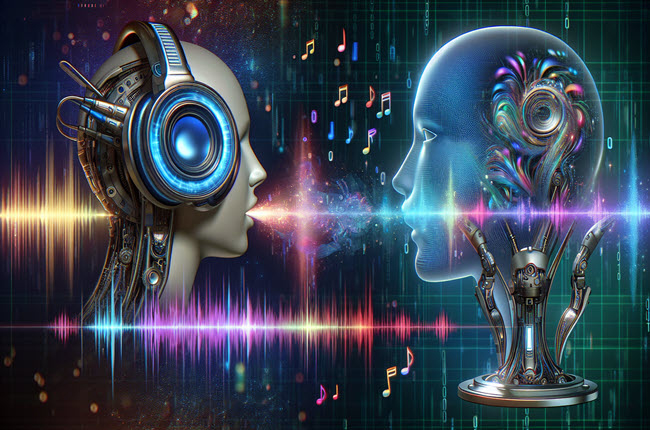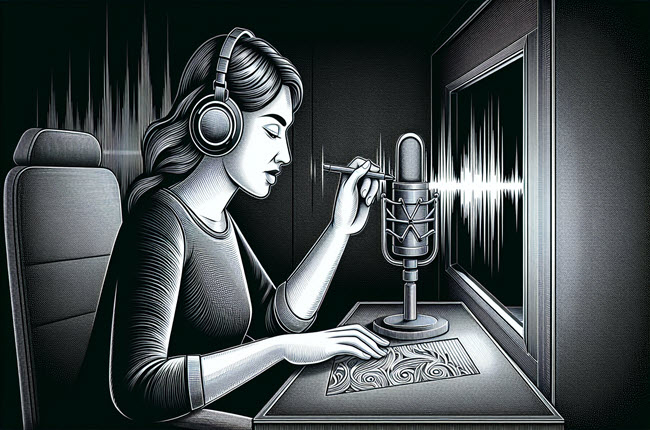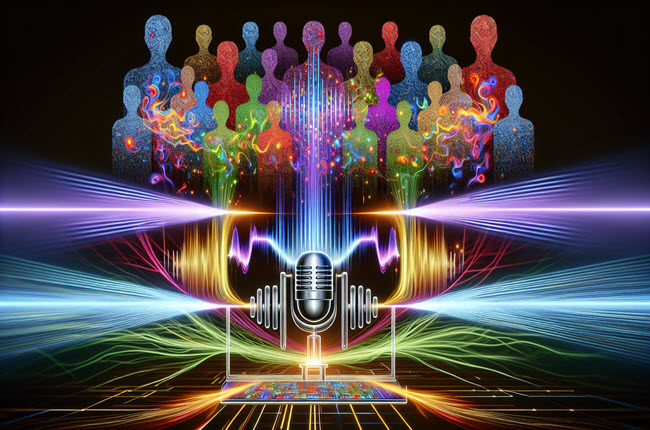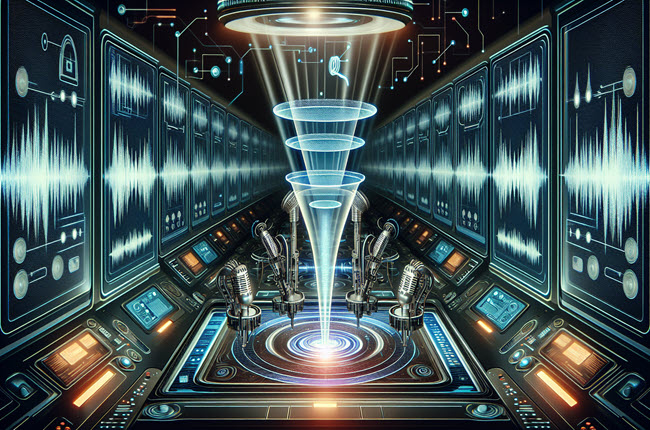
AI voice clone: how does it affect content creation and personal projects? With AI, creating voice replicas that capture your unique tone and character is now possible. Learn how this tech not only changes the way we manage digital identities but also streamlines media production, all while ensuring the authenticity of your AI voice clone.
Key Takeaways
- Voice cloning AI technology can create highly accurate synthetic replicas of human voices, preserving the unique nuances of an individual’s vocal identity for personal or professional use.
- Creating a voice clone involves a multi-step process including recording a clear audio sample, training an AI model with diverse voice data, and generating the synthetic voice with options for instant or professional grade cloning for superior quality.
- The rise of AI voice cloning technology presents both transformative applications and ethical challenges, necessitating strict security measures and consent protocols to prevent misuse and ensure data privacy.
Exploring the World of AI Voice Cloning

Voice Cloning is a significant advancement in technology. It is capable of generating synthetic replicas of human voices with remarkable accuracy. It achieves this by analyzing audio recordings to mimic the tone, pitch, and characteristics of a person’s voice. But what does this mean for you? Imagine being able to preserve your vocal identity in the digital realm, creating a computer-generated replica of your voice that captures your unique vocal nuances.
This isn’t just about creating a digital doppelganger of your voice. It’s about preserving voice cloning, ensuring that the essence of your speech lives on for posterity. Whether it’s for personal use or professional applications, artificial intelligence voice cloning technology can faithfully replicate your voice, capturing the subtle inflections and tonal variations that make your voice uniquely yours.
Crafting Your Digital Voice Twin

Creating your digital voice twin is a remarkable process, one that harnesses the power of artificial intelligence to capture the essence of your voice. Let’s dive deeper into this process, exploring how a clear audio sample can be transformed into a lifelike voice clone.
Recording Your Voice Sample

The first step to crafting your digital voice twin is recording your voice sample with AI voice cloner like RecCloud All-in-One AI Voice Generator. But not just any recording will do. To create a high-quality voice clone, a clear audio sample of at least 1 minute without background noise is requireda clear audio sample of at least one minute without background noise is required. It’s akin to capturing a high-resolution photograph of your voice, where every detail is crucial to the final output.
Training the AI Model

Once your voice sample has been recorded, it’s time to train the AI model. This involves:
- Feeding your voice recordings into an advanced algorithm
- The algorithm learns to mimic your voice by analyzing its unique attributes
- Training data must encompass a variety of phonetic contexts
The voice dataset is curated for training to ensure clean recordings, removing noise and irrelevant parts that may confuse the AI voice clone technology. The AI model goes through multiple training iterations, adjusting its parameters each time to minimize the difference between the original and synthetic voices. The success of AI voice cloning largely depends on a rich diversity of training samples, covering various speech scenarios and intonations.
Generating Your Voice Clone

With the AI model trained, it’s time for the magic to happen: the generation of your voice clone. This process is impressively fast, with instant voice cloning technology capable of producing a voice clone in mere minutes. This rapid process is made possible by the power of artificial intelligence, which can rapidly generate a voice clone from an initial audio sample in mere seconds.
While instant voice cloning is impressive, for those seeking the highest quality, professional artificial intelligence voice cloning offers a superior alternative. Here are some benefits of professional voice cloning:
- It requires at least 30 minutes of audio for initial training.
- It offers improved quality with monthly fine-tuning.
- It results in a voice clone virtually indistinguishable from the original.
The Mechanics Behind AI Voice Cloning
Now that we’ve looked at how to make a voice copy, let’s dig into how it works. AI voice cloning primarily uses deep learning and neural networks. They analyze and create audio. These networks break down voice recordings and predict how to make speech sounds.
Big collections of voice recordings, special computer networks, and speech-making models are important in making clone voice with a AI voice cloner. When the AI learns, it studies lots of human speech examples. Computers learn from real recordings to create synthetic voices that closely mimic the original.
After training, the AI model generates new audio samples that replicate human voices. The technology carefully studies things like tone, pitch, and how people speak from recordings. Then, it makes a fake voice that sounds like the person, keeping all the little details.
Personalize Your AI Voice Experience
Voice cloning AI technology is not just about replicating voices. It’s about creating a personalized voice experience, tailored to your specific needs.
Let’s explore how voice cloning technology allows you to customize your voice experience.
Multilingual Support
AI voice cloning technology is breaking down language barriers with multilingual support. ElevenLabs’ AI and RecCloud AI voice cloning technology supports creating voice clones usng multiple languages and over 100 accents. This means you can clone your voice and have the output speak in different languages while also replicating various accents with high fidelity.
Being able to replicate someone’s voice in different languages helps people communicate worldwide and adapt content for various locations, maintaining a consistent brand feel. Whether you’re a big company or someone making content for people all over the world, AI voice cloning that works in many languages is a big deal.
Customization Options
Beyond languages and accents, AI voice clone programs offers a wealth of customization options.Voice cloning tools like Murf allow users to extensively customize their voice clones by adjusting pitch, speed, and tone to suit various needs. This means you can create several voice styles, such as a peppy voice for advertisements or a gentle whispering tone for meditative content.
Customized voice clones can be saved as voice avatars and used for tailored applications, such as giving a unique tone to presentations. The technology also allows modifying a cloned voice to replicate the characteristics of various personalities or even well-known characters, adding to the versatility and creative potential of voice cloning. To clone a voice, advanced algorithms are employed to ensure accuracy and authenticity.
Applications of AI Voice Clones in Modern Life
AI voice cloner technology is not just about creating voice clones—it’s about how these clones are being utilized in modern life. From enhancing accessibility to revolutionizing content creation, let’s explore some of the exciting applications of AI voice clones.
Enhancing Accessibility
One of the most profound applications is its role in enhancing accessibility. Voice cloning technology provides people with speech impairments the ability to communicate using a voice that mirrors their own personality and speech patterns. For those who have lost their voice, artificial intelligence voice cloning can create a digital voice twin that closely resembles their natural speech, facilitating smoother and more personalized communication.
Beyond individuals with speech impairments, voice cloning technology is enhancing accessibility for users with disabilities. By allowing for personalized voice navigation and assistance across various applications, voice cloning is making technology more accessible and user-friendly.
Content Creation on Demand
In making stuff, cloning a voice makes a big difference. It tries to get rid of problems like having to redo things, by making voices that are almost perfect every time, and sound the same in different types of content. People who make stuff can use AI voice copying to easily make:
- Podcasts
- Videos
- Audiobooks
- Voiceovers
This technology scales content production, ensuring uniform voiceover quality while preserving the creator’s own voice.
Voice cloning technology enables users to push creative boundaries, such as developing unique characters for audiobooks, without the need for multiple voice actors. It’s also solving voice acting challenges in the gaming industry, such as replacing actors who have passed away and facilitating multilingual dialogue production.
Protecting Your Identity with Secure Voice Cloning
As we delve deeper into the world of AI voice cloning, it’s crucial to address the elephant in the room: data security. Given that voice data is highly personal and sensitive, how are companies ensuring its protection? Voice cloning companies collaborate with cybersecurity firms like Tevora to mitigate risks, enhancing security measures such as encryption, secure storage, and access controls to protect voice data.
Advanced technologies that incorporate AI and machine learning are integrated into security frameworks, enabling proactive threat detection and response. This is complemented by measures such as two-factor authentication and mandatory voice print verification systems. OpenAI enforces usage policies for Voice Engine partners, requiring original speaker consent and disclosure of AI-generated voices, and employs watermarking in audio outputs for origin traceability and usage monitoring. However, the risk of misuse exists, necessitating enhanced privacy preservation and secure data handling to guard against unauthorized access.
To ensure the responsible use of voice replication technologies, companies must adopt stringent security measures and ethical AI frameworks.
Navigating the Ethical Landscape of Voice Cloning
As we explore the exciting world of AI voice clone technology, it’s important to address the ethical considerations that accompany it. Regulatory frameworks, such as the General Data Protection Regulation (GDPR) in Europe and the Health Insurance Portability and Accountability Act (HIPAA) in the U.S., are essential for protecting personal data in AI applications. Clear and revocable consent protocols are crucial within a robust framework to manage ethical voice cloning.
However, the rise of deepfake voice impersonations poses risks such as fraud or misinformation campaigns, presenting a need to manage misuse. Misuse could lead to the creation of misleading audio or unauthorized impersonation, resulting in trust and legal issues. Therefore, companies must be transparent in their use of voice cloning technology and clearly communicate its applications. The FCC has taken action against unethical AI-voice practices, including banning robocalls that impersonate individuals without consent. Companies like Synthesia uphold ethical practices in voice cloning by adhering to principles of Consent, Control, and Collaboration.
Real-Time Voice Cloning: From Concept to Reality
One of the most exciting advancements in artificial intelligence voice cloning technology is the capability to clone voices in real-time. This has advanced to the point where AI can now create voice clones instantly, closely mimicking specific voices without extensive preprocessing. Companies like ElevenLabs offer an API that enables real-time, programmable use of voice clones.
OpenAI’s Voice Engine is used by its partners to create pre-scripted content and real-time personalized responses using GPT-4, and it is an integral part of products like ChatGPT’s Read Aloud feature. The Voice Engine can produce a synthetic voice from a brief 15-second sample and supports multiple languages.
Cloning voice AI technology significantly enhances the realism of virtual reality experiences by enabling virtual characters to engage in dynamic and convincing conversations with users using AI voices, similar to the capabilities of voice assistants.
Maximizing Efficiency with Professional Voice Cloning
In the business world, efficiency is paramount. Professional voice cloning significantly reduces the duration of customer service calls by up to 40%, enhancing operational efficiency and reducing costs. Businesses use voice cloning to create training materials with a familiar voice, enhancing learner engagement and aiding in information retention.
Companies use voice cloning for various purposes, such as:
- Maintaining a consistent brand voice across marketing channels, which contributes to customer trust and a unified brand identity
- Offering personalized interactions in industries such as customer service, without the need for multiple voice talents
- Creating multilingual e-learning materials using cloned voices
The professional AI voice cloner by ElevenLabs offers high-grade voice cloning that is indistinguishable from the original and requires extensive audio for training. With advancements in technology, voice cloning software has become increasingly scalable and efficient.
Clone Anyone’s Voice Responsibly
While the potential of AI technology is immense, it’s crucial to consider the ethical implications when cloning voices. Ethical use of voice cloning programs insists on obtaining explicit permission from individuals to replicate their voices, safeguarding personal autonomy and dignity.
Companies like PlayHT allow the cloning of another person’s voice only with the individual’s consent, reflecting the industry’s commitment to ethical practices. Companies like Synthesia uphold an ethical code named the 3Cs—Consent, Control, and Collaboration—to ensure the responsible application of synthetic media technologies.
Conclusion
As we have seen, artificial intelligence voice cloning is a transformative technology that reshapes how we communicate and create content. With its ability to create lifelike voice clones, enhance accessibility, revolutionize content creation, and maintain a consistent brand voice across various platforms, this type of AI technology is truly a game-changer. However, as with any powerful technology, responsible use is crucial, requiring explicit consent from individuals and adherence to ethical practices. The future of AI voice cloning offers endless possibilities, and it is exciting to consider what innovations lie ahead.
Frequently Asked Questions
What is AI voice cloning?
AI voice cloning is a technology that replicates human voices by analyzing audio recordings to mimic their tone, pitch, and characteristics. It’s used to create synthetic copies of voices.
How is a voice clone created?
A voice clone is created by recording a clear audio sample of a voice, training an AI model on this data, and then generating a voice clone using the trained model. It involves recording, training, and generating the clone using AI technology.
How can AI voice cloning enhance accessibility?
AI voice cloning can enhance accessibility by enabling people with speech impairments to communicate using a voice that reflects their own personality and speech patterns.
What are some applications of AI voice clones in modern life?
AI voice clones have a wide range of applications in modern life, including enhancing customer service, creating training materials, maintaining a consistent brand voice, producing podcasts, and developing unique characters for audiobooks and games. They offer versatile uses across different industries.
How is the security of voice data ensured in AI voice cloning?
The security of voice data in AI voice cloning is ensured through collaboration with cybersecurity firms, encryption, secure storage, access controls, and advanced technologies for threat detection and response.


Leave a Comment